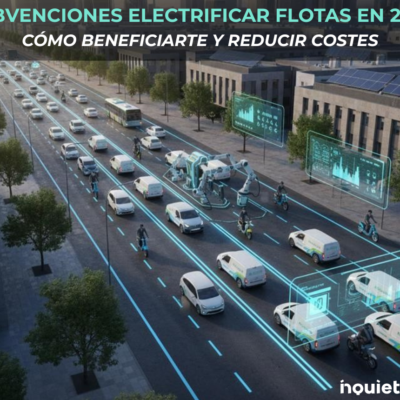The change towards sustainable mobility is being imposed worldwide, not only by dint of its contribution to the reduction in CO2 emissions, but also thanks to the economic benefits it offers. A change that affords a series of advantages over internal combustion vehicles, such as access to an array of fiscal benefits. Would you like to know some of them? We’ll explain further below.
Tax benefits of electric vehicles
One of the most relevant aspects to take into account when moving towards electric mobility are the tax benefits that users can gain by opting for this type of vehicle.
- Savings on registration tax. This tax is intended to record the emissions of each vehicle and it varies depending on them. An electric vehicle, since it does not produce emissions and is energy efficient, is exempt and does not apply.
- Personal income tax reduction for companies. Investment in electric vehicles can be attributed as remuneration in kind. The types of vehicles that can access this type of aid must have been acquired between 28 June 2023 and 31 December 2024 and they must be:
- New electric vehicles.
- Used electric vehicles.
- Plug-in hybrid vehicles.
- Hydrogen fuel-cell vehicles: they are vehicles which have an electric motor that runs on energy generated from a chemical reaction between hydrogen and oxygen.
The subsidy is 15% of the purchase amount, with a limit of 20 thousand euros, so the maximum deduction that can be accessed amounts to a total of 3 thousand euros.
- Road tax subsidies. This tax is paid to the local council of the town/city or municipality where the vehicle is registered and it varies depending on certain factors such as the age or type of vehicle. In the case of electric vehicles, there are already many city councils that encourage their citizens (both individuals, companies and self-employed workers) to move towards sustainable mobility through discounts on road tax. In some cases, these reductions can be as much as 75% of the total price.
- MOVES III Plan. This government initiative provides financial aid to encourage the purchase of sustainable vehicles by companies and the self-employed. This Plan offers important subsidies when purchasing electric vehicles which vary in line with the type of vehicle. Furthermore, this initiative promotes the installation of charging points for electric vehicles.
- Free parking. In urban centres, vehicles with a ZERO label can access free parking in the blue zone and green zone.
- Access to LEZs and restricted areas. In certain areas, sustainable vehicles have privileged access to areas restricted to other vehicles, which helps optimise routes and movements.
- Deductions for the installation of private charging points. This deduction reaches 30% of the total amount of the installation, with a maximum limit of 600 euros.
Basically, electric vehicles are not just a sustainable and efficient mobility solution, but they also provide economic benefits, maximising savings and promoting economic efficiency in modern mobility.




